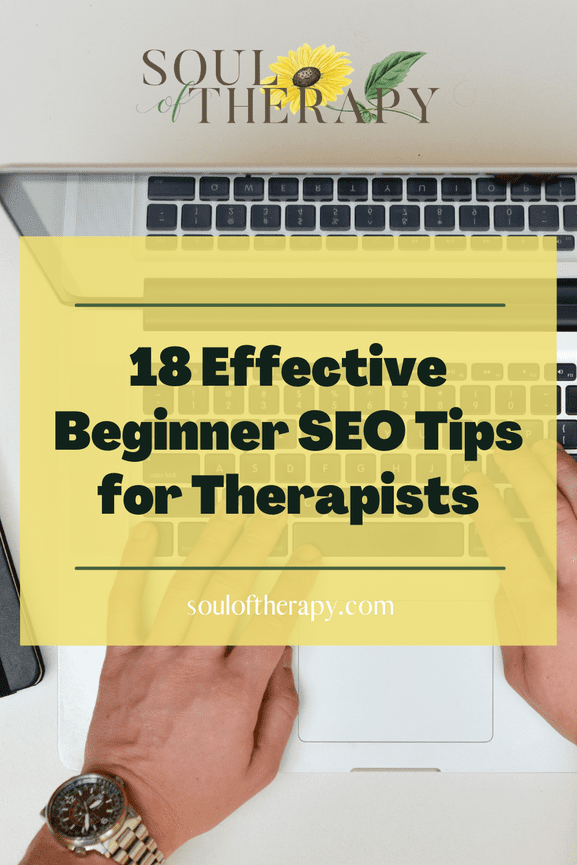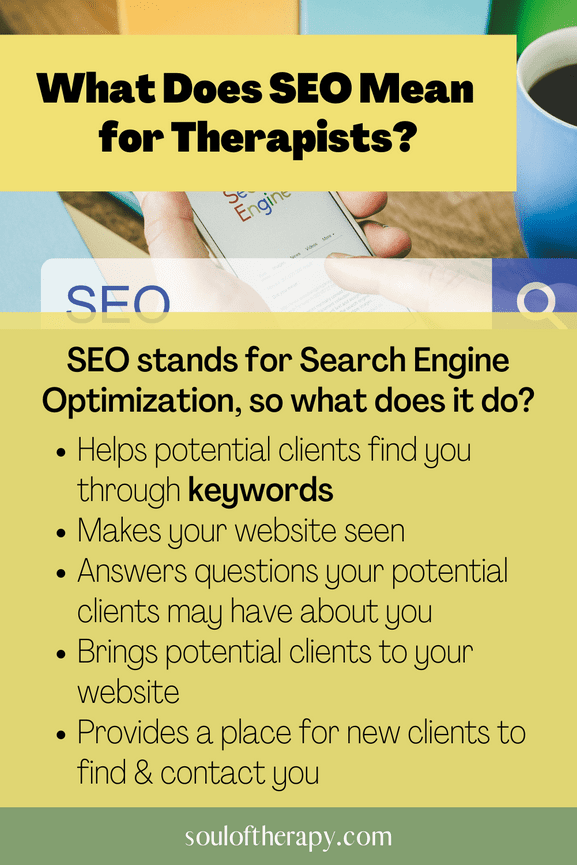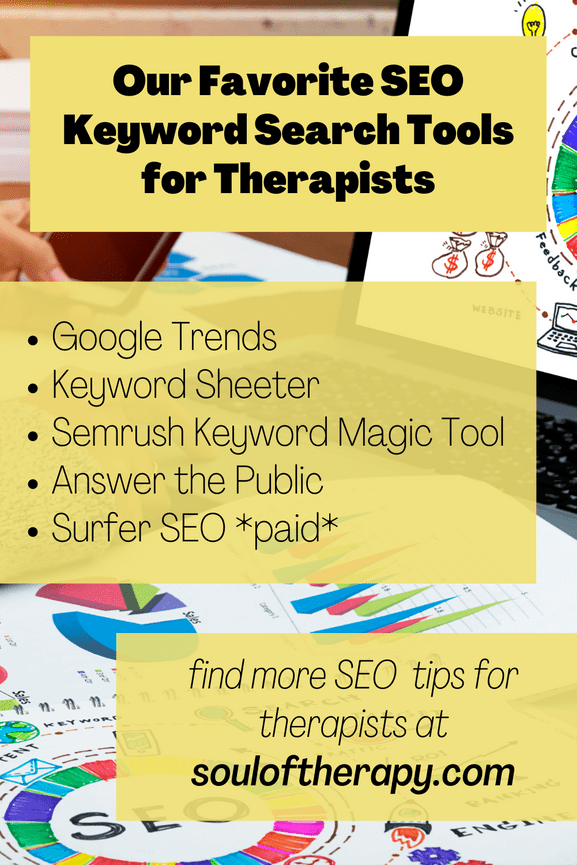So, you're a therapist—a really good one. Maybe you specialize in a really standout niche. Perhaps you have a private practice website, a HIPAA-compliant EMR, and headshots. In other words, you're doing everything right!
And yet, nobody is calling. Are people searching for you? Do they know you exist? And how can they differentiate your therapy practice from everyone else's?
Most people turn to Google (or other popular search engines) when they need a local therapist. So, if you want ideal clients to find you, you basically need to prove to Google's algorithm that you are the best website for their search.
In today's increasingly digital world, SEO for therapists isn't this optional luxury. It's an essential part of your marketing plan.
Unfortunately, many therapists prefer to avoid this process. It's overwhelming! An SEO checklist seems daunting! And shouldn't the ideal client be able to find them a different way?
Maybe. But probably not. I think quality SEO is one of the best ways to market your private practice and find potential clients without excess legwork.
So, what makes me qualified to talk about SEO for therapists? As it turns out, I fell into SEO services accidentally. I began working as a writer for therapists, and I quickly learned that pairing the right keyword research with dynamic, quality content supercharged my clients' search rankings.
Today, I regularly help my clients get on that coveted first page of Google. And while I'll never guarantee a quick fix or magic solution, I do have some tips to share!

Commit to Understanding Search Engine Optimization
Before you can "do" SEO, you need to understand how it works. SEO stands for search engine optimization, and it's an evolving process of creating an ideal website for users.
Think about it. There are billions of websites out there.
SEO helps Google and other search engines categorize legitimate and high-quality content from the rest of the competition. They essentially want to reward a person searching for a specific question.
So, if a potential client searches "couples therapist near me," they are actually generating a keyword. Sites that optimize that keyword will appear on the first page of their search engine results.

Think Like Potential Clients
Proper SEO may seem intimidating, but mastering this craft often comes down to a shift in perspective.
What do potential clients need and search for when they want therapy? What kinds of questions do they type into Google? When Google suggests a specific keyword, are they likely to click on that?
As you reflect on your site, think about how a specific client might feel and react if they stumbled upon it.
Do you have clear call-to-action buttons directing them to contact you? Do you have an aesthetically-pleasing website? Are you using local keywords that attract people who most seem interesting to you? And if you offer online therapy, are people in your targeted regions able to find you?
A client may just use one search term to find their next therapist. Do you know what that search term is, and are you delivering what people searching for therapy need?
Perform a Site Audit
A site audit is just like any other audit: it's like a performance review that reveals your website's strengths and weaknesses. An effective audit can help you review future SEO needs and SEO strategies.
You can either pay for a site audit (we offer flat-rate website audits and content consultations). Or you can do it yourself by running your own website through a site audit tool, locating any technical errors, and assessing your content.
Here is an excellent checklist for getting started.
Check Your Site Speed
Therapists may be known for their patience, but that doesn't mean people want to stick around for your site to load. Research shows the sweet spot is about 0-4 seconds (more around 2 seconds). In addition, 70% of consumers acknowledge that page speeds impact their willingness to purchase from an online retailer.
Timing is critical, and optimizing your site speed is an essential part of your technical SEO.
You can improve your speed by:
-
enabling compression
-
reducing the number of redirects
-
eliminating or reducing videos
-
optimizing image size
-
identifying slow-loading pages
If it's becoming too technical for you, consult with your web developer or designer. They should be able to fix things on the backend.
Really Focus On Your Home Page
Potential clients will spend time here, so you want to make sure this web page is as dynamic as it can be! That includes making it aesthetically pleasing while also having compelling copy that keeps people intrigued.
There's a lot of on-page SEO that can go into a home page, but at the very least, you should have:
-
services sections that detail your specialties
-
plenty of call-to-action buttons that direct people to contact you
-
images (particularly of you!)
-
content that matches local SEO search terms
Do Your Own Keyword Research
Keyword research is the foundation of a good SEO strategy. You want your website to match terms that potential clients naturally search for. This is the bread and butter of effective SEO practices.
For example, if you're an EMDR therapist, ranking in terms relevant to EMDR and trauma therapy is highly beneficial. You especially want to rank for local SEO in these search terms. That's the holy grail of optimizing search results.
On that same note, if you're an EMDR therapist, ranking in terms relevant to ice cream or dancing lions isn't. You don't want to direct the wrong website traffic to your page. That's a waste of your time, money, and resource allocation.
A primary keyword refers to the main keyword you want to target. But a good SEO strategy also focuses on secondary keyword research, which considers other keywords that might be relevant to your website's focus.

Some of our favorite free keyword research tools are:
Google Trends: Easy-to-use and shows the search popularity of a specific keyword over time.
Keyword Sheeter: Also easy-to-use and collects autocomplete suggestions and relevant keywords and Google trends directly from Google searches.
Semrush Keyword Magic Tool: You can make up to 10 queries per day with the free version, and you can filter search results by questions, keyword density, and search density.
Answer The Public: Offers numerous questions, prepositions, and comparisons for your targeted keyword.
Our favorite PAID keyword research tool?
Surfer SEO: Surfer SEO is our preferred premium tool for keyword research and content planning. In fact, this article was written with help from Surfer! We use it to prepare, plan, and optimize content. Basic plans are $49 per month (and this plan should be sufficient enough for most counseling practice pages).
List Yourself on Google My Business (Google Business Profile)
Google has an expansive directory of local businesses. Getting listed on their directory can be super useful for local therapists wanting to easily boost their local SEO.
You can get started on Google My Business here by answering a few basic questions about your business type and location. After you finish, you will receive a verification postcard at the address you provide.
Google pays attention to three main factors when ranking your business listing:
-
relevance: how well your business listing accurately meets the user's search intent
-
proximity: how your local SEO matches with your indicated location
-
prominence: how well your site performs, contains quality content and has effective web design and strategy
Consider Joining National and Local Directories
It's no secret that sites like Psychology Today or Good Therapy tend to rank right at the top when you search for therapist-related terms. That's because they have extensive content, comprehensive resources, and top-notch SEO services.
In other words, their SEO efforts work on a massive scale. You won't compete with them. But you can, however, consider joining them!
If you're first starting your counseling practice, we recommend considering 1-2 directories to get started. Some of them will provide a backlink to your current site.
Furthermore, you should also focus on enhancing citations (these are another type of backlink). It's kind of like virtual Yellow Pages, and they build your business directory and reflect positively on your own site.
Decide Your Blog Post Strategy
I'll start by saying that I'm biased and think that a comprehensive blog post strategy is one of the best investments you can make for your private practice website. A good blog post can generate traffic for years. And once it's written, it becomes a passive drip of on-page SEO. As a mental health therapist, this can supercharge your online presence.
There isn't a magical number when it comes to how often you should post. Instead, it's much better to have high-quality content that targets potential clients. This content tends to be long (around 1500-2000 words) with cited sources.
The best part is that using the right keyword research in your blog posts can quickly augment your site to the top of Google search results. If you want to automate this process, learn more about our content writing packages.
Write Better Blog Posts
It isn't enough to just muse about your own thoughts about couples therapy or CBT. People care, but there are so many websites out there, and you want a search engine to find yours among a sea of competition.
Your content has to be top-notch. And in addition to being written well, you should focus on:
-
integrating keywords naturally and often
-
using images and alt text to describe your images
-
including internal and external linking (more on that below)
-
organizing your posts appropriately (H2 and H3 headers, short and concise paragraphs, easy scannability)
Be Careful of SEO Gurus
Here's the bad news: most SEO gurus are scams. There are no official licenses or credentials for SEO consulting, and that means many people take advantage of ignorant consumers to make a quick book.
There are great services out there, but I want to drop a word of caution and warn you to avoid anyone who:
-
makes bold claims about your website ranking as #1 with specific keywords
-
charges money in exchange for links (this is known as black-hat SEO)
-
spams your site on other blogs or networks
-
isn't transparent about their process!
But Ask SEO Professionals These Questions
If you want to outsource this task (which can be a REALLY smart investment), here are some smart questions to ask:
-
What does your off-page SEO strategy look like?
-
What does your on-page optimization process look like?
-
How do you source and optimize local keywords?
-
Have you done therapist SEO in the past? Can I see an example of a therapist website you've helped grow?
-
How do you ensure my ideal client finds a particular page on my website?
-
Do you have any testimonials from mental health professionals?
The right SEO professional won't try to sell you anything that sounds too good to be true. Likewise, they will usually offer you an SEO checklist that shows what they can and can't do for your private practice site.
Link to Yourself
Internal links keep visitors clicking around on your page. Ideally, this strategy also leads to more conversions (i.e., people filling out your contact form or calling you).
For example, this is us linking to our contact form if you want more information!
Link to Other Sites
Outbound or external links point your website to other domains. For example, this links to one of my other websites!
It's important to link to other high-quality sites. When writing blog posts, that includes linking to original research sources or authoritative bodies like the CDC or Mayo Clinic.
Don't link everything. 1-2 links per 1000 words should suffice! And if you really enjoy someone else's article, giving them that backlink is like saying "thank you" for writing such an amazing article.
Look into HARO
HARO (Help a Reporter Out) is a great source for securing high-quality backlinks. I've used HARO both as a journalist and as a query responder.
You respond to various media sources seeking expert responses from mental health professionals. It's one of my favorite free tools, and you can sign up to receive emails three times per day.
Learn more about how the process works here.
Never Pay for Links
It's a waste of money and time. Google specifically bans this practice, and doing so will only hurt your site.
Optimize Your Meta Descriptions
A meta description is a short blurb that summarizes a particular page on your own website. Think of it as a tiny advertisement where a search engine is trying to draw in customers to your page.
Google sometimes rewrites meta descriptions to optimize them, but that doesn't mean you still shouldn't write them (especially for high-volume keywords). Keep in mind that they are short (155 characters at most), so they should resemble more of a tweet than a blog post.
It's a good idea to write meta descriptions for your home page, service page, 'about me' page, and any important blog posts. Don't forget to add a call-to-action to generate traffic to your contact form!
Give Your Web Pages Title Tags
A title tag is the "title" of a website page. You don't want a super clunky title! If you, for example, have an article about couples therapy, a good title tag should reflect exactly that.
Your website builder should allow you to customize tags for each page. This is an essential aspect of technical SEO- if you aren't sure how to do it, consult with your developer.
Help! I'm Overwhelmed!
If you read all this and you don't know what to do next, take a deep breath!
SEO for therapists truly is a marathon. Likewise, you don't need to get it 100% down immediately. In fact, in many cases, just doing something- no matter how small- makes better traction than doing nothing.
So whether that means committing to writing a blog post once a week or hiring a web developer to enhance your existing site, those small steps can make a significant difference.
At Soul of Therapy, we help our clients generate traffic and build a high search volume for their sites. We are therapists who work with therapists, and we're here to help you scale your private practice website. Contact us today to learn more!


0 Comments